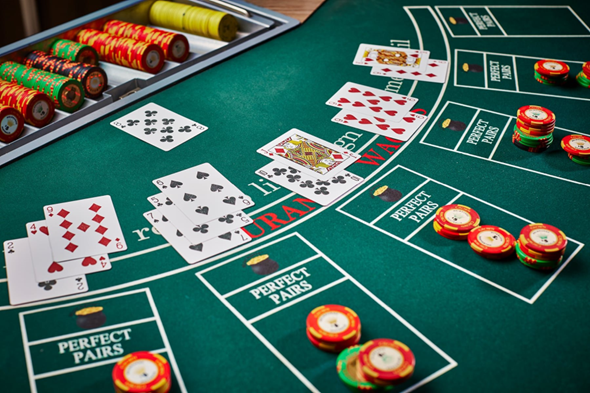Blackjack players have noticed a significant shift at the tables in Las Vegas. According to this article by ABC News, winnings in 21 aren’t as substantial as they once were. This trend is not coincidental; it’s a deliberate move by operators to extract more money from gamblers, altering the dynamics of one of the most popular casino games. But what are the consequences of this move to great casinos?
Why are Casinos Increasing the House Edge?
Traditionally, blackjack has been a favorite among players. According to the monthly research from KTO, one of the biggest online casinos in Brazil, blackjack online is the favorite card game and one of the most popular live casino games, featuring the following tables as the most populars in June.
Because of its relatively low house edge, if a player follows a basic 21 strategy, the house edge is typically around 0.5%. This favorable edge, combined with the excitement of the game, has made blackjack a staple in casinos worldwide.
However, data from the Nevada Gaming Commission indicates that blackjack players lost more money last year than they have in nearly two decades. This spike in losses isn’t just due to an increase in the number of players. Instead, it’s largely because casinos have changed the rules to tilt the odds further in their favor.
The Shift from 3-to-2 to 6-to-5 Payouts
One of the most significant changes is the alteration of the payout for a blackjack. Traditionally, a blackjack paid 3-to-2, meaning a $10 bet would return $15 in profit. This payout is crucial as it helps players recoup their losses and maintain a lower house edge.
Recently, many casinos have shifted to a 6-to-5 payout for a blackjack. While this might seem like a minor adjustment, it has a substantial impact on the game’s odds. Under the 6-to-5 payout, a $10 bet only returns $12 in profit. This change increases the house edge from approximately 0.5% to 1.9%, nearly quadrupling it.
This change means that over thousands of hands, players are likely to lose more money. The rationale for most casinos is straightforward: if there’s more money to be taken, they will take it. However, this approach raises ethical concerns about fair play and the long-term sustainability of player engagement.
Interestingly, these unfavorable odds are primarily implemented at lower-limit tables, where casual players and tourists are more likely to play. High-stakes tables, frequented by high rollers, generally retain the more favorable 3-to-2 payouts. This discrepancy suggests that casinos are targeting less experienced and lower-budget players, whom they perceive as more expendable.
Why Serious Casinos Avoid This Strategy
For serious and reputable casinos, maintaining fair odds is crucial for sustaining player trust and long-term business success. Here are several reasons why casinos should resist the temptation to worsen not only blackjack, but all game odds:
Player trust and loyalty: fair odds foster trust and encourage player loyalty. Players who feel they have a fair chance are more likely to return and recommend the casino to others.
Reputation: casinos that prioritize fair play enhance their reputation, attracting a broader and more diverse clientele, including discerning high rollers who value integrity.
Sustainability: short-term profit gains from worsening odds can lead to long-term losses. Disenchanted players may eventually abandon casinos with poor odds, seeking fairer alternatives elsewhere.
Ethical considerations: ethical business practices are increasingly important in today’s market. Casinos that uphold fair play principles demonstrate a commitment to responsible gaming and customer care.
The trend of worsening blackjack odds in Las Vegas casinos is a concerning development for both players and the industry. While it might boost short-term profits, it risks eroding player trust and long-term loyalty in an already competitive market. Serious casinos should prioritize fair odds and ethical practices to ensure sustainable success and maintain their reputation as fair and enjoyable gaming destinations. Additionally, the concern for players’ mental health and the promotion of responsible gambling are integral to maintaining fair odds and should be considered at every table worldwide. By upholding these principles, casinos can foster a more trustworthy and enduring relationship with their patrons.




